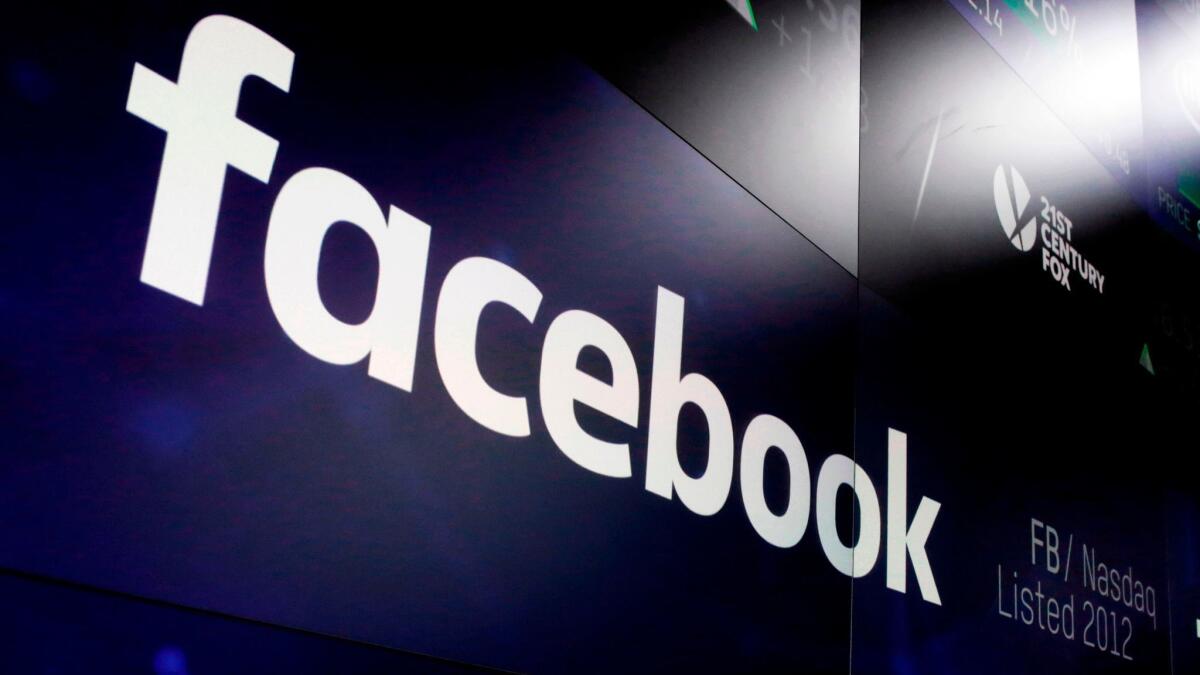Facebook censored a post for ‘hate speech.’ It was the Declaration of Independence

- Share via
At first glance, the Vindicator’s Facebook promotion did not seem designed to make waves.
The small newspaper, based in Liberty, a Texas city of 75,000 outside of Houston, planned to post the Declaration of Independence on Facebook in 12 daily installments leading up to the Fourth of July — 242 years after the document was adopted at the Second Continental Congress in 1776.
But on the 10th day, the Vindicator’s latest installment was removed by Facebook. The company told the newspaper that the particular passage, which included the phrase “merciless Indian Savages,” went against its “standards on hate speech,” the newspaper wrote.
The story about how Facebook had censored one of the United States’ founding texts on the grounds that it was hate speech has traveled around the world. And it is another glaring example of how the mechanisms that tech companies use to regulate user content — many of which involve algorithms and other automated processes — can result in embarrassing errors. Facebook uses a mix of human work and technological efforts to moderate its content.
Facebook has since apologized to the Vindicator and restored the newspaper’s post.
“The post was removed by mistake and restored as soon as we looked into it,” the company said in a statement distributed by spokeswoman Sarah Pollack. “We process millions of reports each week, and sometimes we get things wrong.”
The Vindicator’s managing editor, Casey Stinnett, wrote that the newspaper believed that the post had been flagged through an automated process in the piece it wrote about the ordeal. The passage that Facebook blocked, paragraphs 27-31, speak unsparingly of England’s King George III as part of a list of dozens of complaints about the king that follow the text’s much repeated opening lines.
“He has excited domestic insurrections amongst us, and has endeavoured to bring on the inhabitants of our frontiers, the merciless Indian Savages, whose known rule of warfare, is an undistinguished destruction of all ages, sexes and conditions,” it reads.
Hate speech is generally not permitted on Facebook, though the company notes that context is important to its evaluations. Pollack said the phrase could violate Facebook’s hate speech policies but its removal was a mistake due to a misunderstanding that the quote originated from the Declaration of Independence.
“Unfortunately, Jefferson, like most British colonists of his day, did not hold an entirely friendly view of Native Americans,” the Vindicator noted, adding that “there is a good deal in that passage that could be thought hateful.”
Stinnett said the episode was a reminder that the newspaper “has become dependent, perhaps too dependent,” on Facebook.
“Some Vindicator stories posted on thevindicator.com attract thousands of page views, but usually only after links to them are shared on Facebook,” Stinnett wrote.
Last year, some Donald Trump supporters thought NPR was spreading “propaganda,” after it tweeted the Declaration of Independence’s text in short portions.
Facebook has come under the microscope for removing some content in the past, including the famous photo from the Vietnam War that depicts a naked child running away after a napalm attack. As the Post’s Elizabeth Dwoskin and Tracy Jan wrote, “Moderators have deleted posts from activists and journalists in Myanmar and in disputed areas such as the Palestinian territories and Kashmir and have told pro-Trump activists Diamond and Silk they were ‘unsafe to the community.’”
Stinnett wrote that he saw some irony in the episode.
“This is frustrating, but your editor is a historian, and to enjoy the study of history a person must love irony,” Stinnett wrote. “It is a very great irony that the words of Thomas Jefferson should now be censored in America.”






